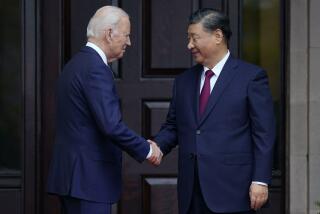In China, Brown Cites Success on Trade, Rights
- Share via
BEIJING — Commerce Secretary Ronald H. Brown asserted Tuesday that a new U.S. emphasis on “commercial diplomacy” toward China is not only producing big trade deals but also progress on human rights.
A formal U.S.-China dialogue on human rights issues, suspended in the spring, will resume in late September when Foreign Minister Qian Qichen visits the United States, Brown announced at a news conference here.
While resumption of talks will not automatically benefit Chinese dissidents, Brown treated renewal of the dialogue as a significant step.
“Commercial engagement has had a greater impact than the threat of commercial disengagement,” he said, adding that he was “exhilarated by the results of our first 2 1/2 days in Beijing.”
Since Brown’s arrival Saturday, executives of leading U.S. corporations traveling with him have “already signed agreements with a total value of almost $5 billion,” he said.
“We came with high expectations about our ability to have a profoundly positive impact on the bilateral relationship between China and the United States,” he said. “We have already met and surpassed those expectations.”
The overall tone of Brown’s remarks Tuesday, both at the news conference and in a business lunch speech, was the warmest here by any top U.S. official since the 1989 crackdown on the Tian An Men Square pro-democracy protests.
President Clinton severed the link between human rights and trade issues in May. But Brown went further in his comments Tuesday, stressing that while the United States wants to see human rights progress here, threats are of no use.
“You can adopt a ‘feel-good’ policy, which causes you to have the ability to make strong statements and achieve no results from those statements,” Brown said. “Or you can adopt a pragmatic, common-sense policy, which helps you achieve your goals.”
In a lunch speech to U.S. and Chinese business representatives, Brown outlined a vision of “commercial diplomacy” that he said can bring greater shared prosperity to the two nations and the world.
“The United States has sent substantive signals that we regard China as a commercial ally and a partner--that China’s long history is deserving of respect and even deference that she has not always received,” Brown said to the business group. “Once divided by ideology, we are now drawn together by shared economic interests.”
Brown brushed off a threat made Monday by his counterpart, Foreign Trade Minister Wu Yi, that if China’s effort to join the General Agreement on Tariffs and Trade (GATT) by the year’s end is unsuccessful, Beijing will no longer be bound by previous trade and economic commitments.
Asked at his news conference whether Wu’s comments cast any cloud over the generally upbeat tone of his visit, Brown said: “You have to be a pretty negative person to be looking for a cloud today, with the incredible progress that we’ve made in just 2 1/2 days. I don’t see any cloud. I think we continue to make progress in our discussions with the Chinese” about GATT.
The mood of exhilarated optimism, reminiscent of attitudes often shown by high-level U.S. delegations to China in the 1970s and 1980s, was also evident among the 24 executives of leading U.S. corporations traveling with Brown.
“I’ve been extremely pleased with the dialogue, with the opening up,” said Leslie McCraw, chairman and chief executive officer of Fluor Corp. “The attitude of the Chinese has been exceptionally positive. . . . We view China as clearly one of the great emerging market opportunities for a company like ours.”
Brown’s visit marks a shift of the main focus in U.S.-China relations “to business issues, commercial issues, rather than philosophical issues,” McCraw said. “I think these other agendas can be addressed if we are engaged commercially.”
Details of most of the agreements cited by Brown were not immediately released. While the sums involved totaled more than $4.7 billion, not all of this amount represents U.S. sales.
Entergy Corp. said Tuesday it signed a memorandum of understanding, in partnership with the Lippo Group in Hong Kong, for a Chinese power plant deal it valued at $1 billion.
Brown presided at a signing ceremony for the Wing Group to build a $2.2-billion liquefied-natural-gas turbine. AES China Generating Co., a joint venture with Virginia-based AES Corp., signed a $1.5-billion contract to upgrade a power plant.
TRW Inc. announced that with a Chinese partner, Suman Group Ltd., it signed an agreement with Beijing Cable TV Network to supply 1 million de-scrambler units for household delivery of television programming.
Sprint Communications Corp. announced a pact to expand China’s connections to the global Internet service, which links an estimated 2 million computers in 154 countries.
More to Read
Sign up for Essential California
The most important California stories and recommendations in your inbox every morning.
You may occasionally receive promotional content from the Los Angeles Times.










